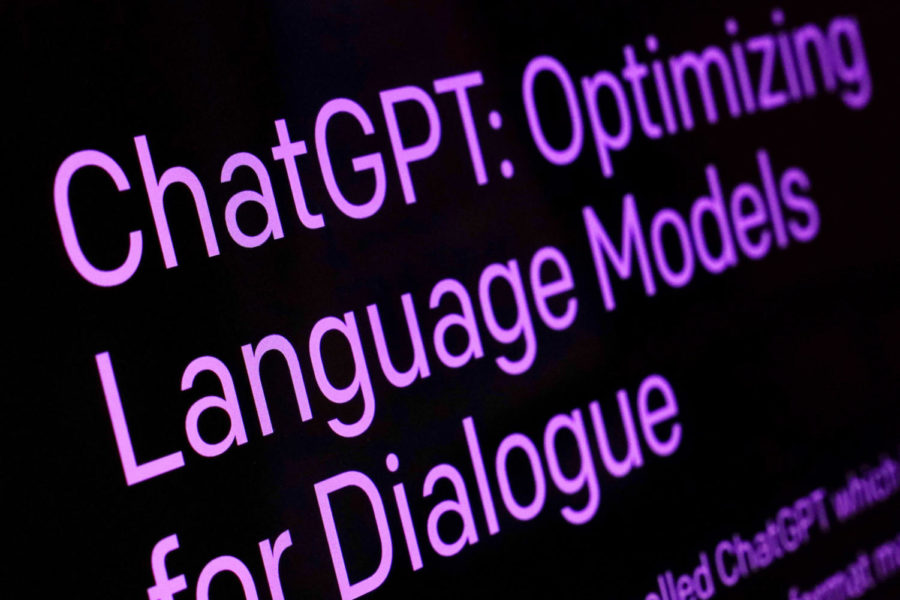ChatGPT: The AI language model shaping the future of conversational technology
Text from the ChatGPT page of the OpenAI website is shown in this photo, in New York, Thursday, Feb. 2, 2023. (AP Photo/Richard Drew)
Published Feb 10, 2023
ChatGPT (Chat Generative Pre-trained Transformer), launched in November 2022, is the new artificial intelligence software that can seemingly do it all – write code, tell jokes, carry on a conversation and also write journalism articles, like this one:
OpenAI, the cutting-edge research organization, has created a language model, ChatGPT, that is shaking up the conversational technology industry with its human-like responses.
ChatGPT is a machine learning-based language model that uses an enormous corpus of text data to generate human-like responses to text inputs. It has the ability to handle a wide range of conversational topics and can generate responses that are contextually appropriate and grammatically correct.
“ChatGPT represents a major step forward in the development of AI,” says OpenAI CEO, Sam Altman. “We’re excited about the potential for ChatGPT to change the way we interact with technology.”
However, like any advanced technology, ChatGPT has its challenges. The model is trained on a large amount of data from the internet, which can include biases, inaccuracies, and offensive content. This has the potential to result in inappropriate or insensitive responses, a problem for businesses and individuals who use the model in their work.
The potential for ChatGPT to be used for malicious purposes, such as creating fake news or spreading misinformation, is another concern. OpenAI is working to address these challenges by developing ways to detect and mitigate the impact of biased or inaccurate responses.
Despite these challenges, experts predict a bright future for ChatGPT, as it continues to play a significant role in shaping the future of AI and human-computer interaction.
“The possibilities for ChatGPT are truly endless,” says OpenAI co-founder, Ilya Sutskever.
In conclusion, ChatGPT is a game-changer in the conversational technology industry, but also raises important questions about the potential risks and challenges associated with this technology. The next few years will determine the impact that ChatGPT will have on the world, and whether it will be a force for good or a source of harm.
The above article and the headline is nearly 300 words and was generated in less than a minute, writing on the prompt, “Please write me a journalism article in AP style about ChatGPT’s creation, capabilities and issues. Include quotations.”
John Tisdale, associate professor of journalism, said that using an AI software, even years ago to write an article recapping a sporting event, was not unheard of, but that there are problems.
“It’d be milquetoast,” Tisdale said. “Here’s the problem with this software: What about the observational techniques? Plus, most of this stuff has to be open source in order for it to find it, and for a lot of research that I’ve done in my adult life, none of it is open source.”
Antonio Sanchez, associate professor of computer science, echoed this claim as he said that ChatGPT is limited to the knowledge and choices that are already on the internet.
In talking about artificial intelligence, Sanchez made clear the difference between information (i.e. knowing the capital of Texas) and knowledge (i.e. knowing the best restaurant in Austin).
“You have to measure the quality of the knowledge more than the factness,” Sanchez said. “I admit that it can create knowledgeable essays, but it has to make choices. It is the quality of the choices that counts.”
Both professors agree that ChatGPT will affect how they teach, especially as artificial intelligence continues to improve.
Sanchez said that it is important for everyone to accept the fact that artificial intelligence is here to stay and to not be fearful of it.
“All we know is what we know today,” Tisdale said. “I can’t tell you what it will be like in five years. If I could predict the future, I would’ve retired 15 years ago and been a billionaire with oil stocks.”
ChatGPT is still receiving a lot of attention in the media, and through OpenAI’s website, anyone can experiment with ChatGPT for free.



